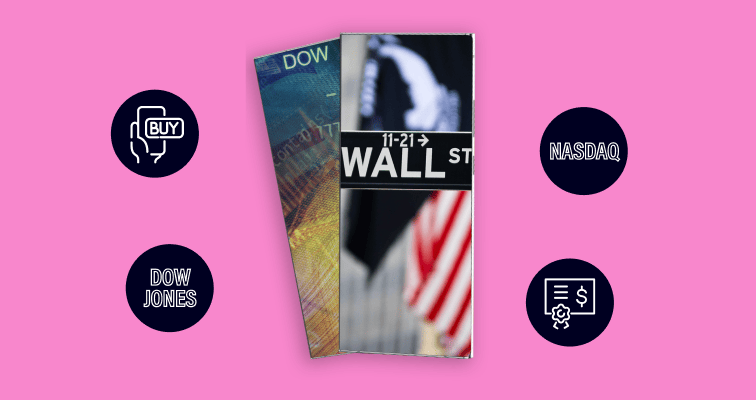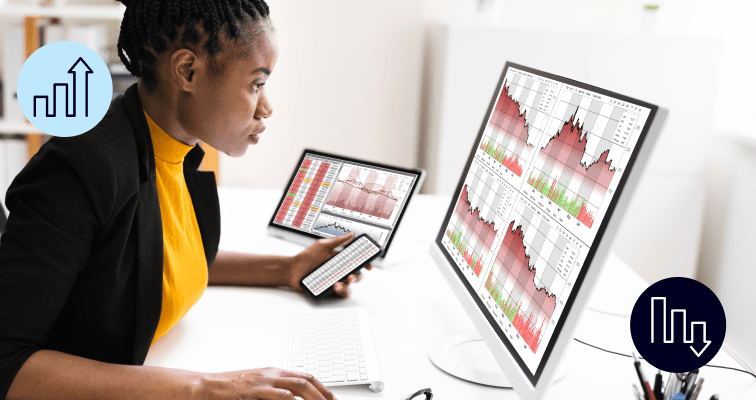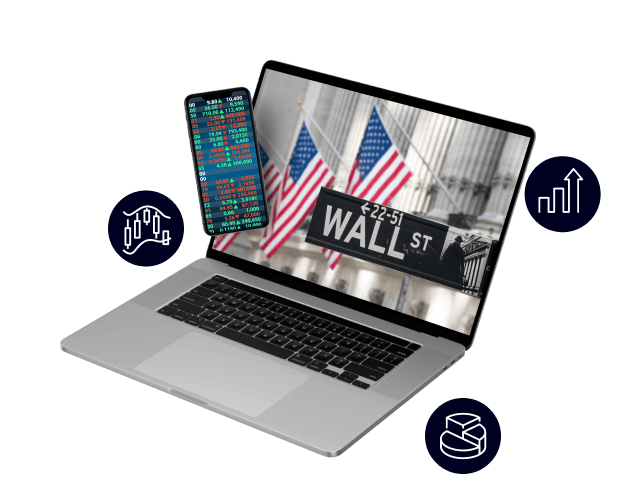The most popular stock exchanges include the New York Stock Exchange, the NASDAQ, the London Stock Exchange and the Tokyo Stock Exchange, to name but a few. Their appeal is based on a range of factors, including the market capitalisation of the firms listed on the exchange.
Learn exactly what a stock exchange is, how they work, and why the way they are set up can make them more or less attractive to investors and large corporations which might consider listing on them.
What is a stock exchange?
A stock exchange is a centralised platform that facilitates the buying and selling of a wide range of
Companies aim to place their shares on an exchange that will have the most investors interested in buying them. As a result, stocks are not necessarily listed on exchanges in the country in which a company is based.
Tip: Stock exchanges support trading in equities (stocks), but also other assets as well, such as
What are the 10 most popular stock exchanges?
Firms considering listing on a stock exchange will base their decision on which they consider to be the best marketplace for their stock. They can change the exchange on which they list at any time, and even list on two or more exchanges at once, which is referred to as
There are more than 60 stock exchanges around the world but below are the top 10 largest stock exchanges in the world based on

1. New York Stock Exchange (NYSE)
The New York Stock Exchange (NYSE) is located in Manhattan’s Financial District, in the heart of New York City. Established in 1792, it is the world’s largest stock exchange by market capitalisation and lists most of the firms that form the S&P 500
2. NASDAQ (NASDAQ)
Established in February 1971, the NASDAQ stock market was the first fully electronic stock market. It is also the world’s second-largest stock exchange and has over 3,000 companies listed on it, including pioneering tech stocks such as Apple, Tesla and Amazon.
Tip: A tech start-up might favour listing on the NASDAQ because investors in the tech-sector already gravitate to that exchange.
3. London Stock Exchange (LSE)
The London Stock Exchange (LSE) is one of Europe’s largest stock exchanges, and the seventh largest worldwide. It is considered one of the most diverse stock exchanges, with companies listed from over 60 nations, across 40 sectors.
4. Tokyo Stock Exchange (TSE)
The Tokyo Stock Exchange (TSE) is the third largest stock exchange on the planet in terms of market capitalisation. It is also the largest in the Far East by a considerable margin. It has over 3,700 companies listed on it, including global brands such as Mitsubishi, Honda and Toyota.
5. Euronext
Euronext is the largest stock exchange in Europe. It was formed by the merger of three key European stock exchanges: the Paris, Amsterdam and Brussels stock exchanges. Some of the most popular Indices found on the Euronext include the CAC 40 and the NL 25.
6. Hong Kong Stock Exchange (HKEX)
The Hong Kong Stock Exchange (HKEX) is one of the world’s largest

7. Shanghai Stock Exchange (SSE)
The Shanghai Stock Exchange (SSE) is the largest stock exchange on mainland China. Each listed company on the SSE has A-shares and B-shares. The A-shares are listed in yuan, while the B-shares are listed in US dollars and are available to foreign investors.
8. Shenzhen Stock Exchange (SZSE)
The Shenzhen Stock Exchange (SZSE) is the second-largest stock exchange in mainland China. It has a reputation for supporting trading in smaller dynamic companies with exposure to
9. Australian Stock Exchange (ASX)
The ASX is based in Sydney, Australia, and is the world’s 18th largest stock exchange by market capitalisation. It is popular among investors looking to buy stocks of companies with exposure to the commodities sector.
10. Toronto Stock Exchange (TSX)
Canada’s largest stock exchange is the Toronto Stock Exchange. It’s the 12th largest stock exchange in the world and includes over 1,500 listed companies, spanning a range of sectors.
Tip: US listed stocks make up more than 60% of the total global stock market.
Stock exchange open and close times
The market hours for a particular exchange all differ, and so investors should understand when they can buy and sell the stocks of companies that trade on a particular exchange.
These timings can change to accommodate holidays so keeping up to date is best done by accessing a reliable market hours page.
| Exchange | Opening Times (GMT) | Opening Times (Local Time) | Lunch (Local Time) |
|---|---|---|---|
| New York Stock Exchange | 14:30–21:00 | 09:30–16:00 (EDT) | No |
| NASDAQ | 14:30–21:00 | 09:30–16:00 (EDT) | No |
| London Stock Exchange | 08:00–16:30 | 08:00–16:30 (GMT) | 12:00–12:02 (GMT) |
| Tokyo Stock Exchange | 00:00–06:00 | 09:00–15:00 (JST) | 11:30–12:30 (JST) |
| Euronext | 08:00–16:30 | 09:00–17:30 (CEST) | No |
| Hong Kong Stock Exchange | 01:30–08:00 | 09:30–16:00 (HKT) | 12:00–13:00 (HKT) |
| Shanghai Stock Exchange | 01:30–07:00 | 09:30–15:00 (CST) | 11:30–13:00 (CST) |
| Shenzhen Stock Exchange | 01:30–07:00 | 09:30–14:57 (CST) | 11:30–13:00 (CST) |
| Australian Stock Exchange | 00:00–06:00 | 10:00–16:00 (AEDT) | No |
| Toronto Stock Exchange | 14:30–21:00 | 09:30–16:00 (EDT) | No |
How do stock exchanges work?
Stock exchanges operate under strict rules and regulations, to ensure that the trading in assets is efficient and fair.
Companies that want to list on a stock exchange must meet certain criteria and comply with ongoing reporting obligations. Investors, brokers and banks that buy and sell assets on stock exchanges are also subject to certain rules.
Tip: A company which fails to comply with the requirements of an exchange may find that its stock is delisted.
The vast majority of trading activity in the stock markets is carried out in what is calledin the
Tip: Every time you buy a stock on a stock exchange, you become a part-owner of a company.
The

Final thoughts
Stock exchanges compete with one another for business. Part of that process involves creating an environment that is beneficial to its major users and balancing the objectives of companies who want investors to buy their shares, and investors who want to see their investment generate a return.
Buyers and sellers can feel protected by the rules put in place by an exchange, which should allow them to concentrate on researching which stock will best help them to meet their investment aims. Remember, regardless of the stock exchange, the price of stocks can rise and fall, so only invest in assets that suit your
Visit the eToro Academy to learn more about why and how to invest in stocks.
FAQs
- Why do firms list their stocks on more than one exchange?
-
Some firms, such as Carnival, consider a dual-listing if they think there will be potential buyers of their stock in two separate regions. If a firm believes that investors in one country might be reluctant to buy stocks on an exchange in a different country, they might decide to list in both.
- What are ADRs and GDRs?
-
American Depositary Receipts (ADRs) are shares listed on a US stock exchange that track the price of a stock listed on an overseas exchange. For example, Alibaba Group stock has a primary listing on the Hong Kong Stock Exchange, but US investors can buy shares in the ADR version of the stock, which are listed in the US. Global Depositary Receipts (GDRs) offer the same functionality, but can be listed on any global exchange, not just those in the US.
- Can I buy shares in a company when it first lists using an IPO?
-
Investors can occasionally buy shares in a company when it first lists. The main aim of a company carrying out an IPO is to make sure that all of its stock is bought on day one, which can help to generate a positive feeling towards the stock. If the pool of retail investors is considered too small for that to happen, a company might give big investment banks the exclusive rights to buy IPO stock. Those banks guarantee that all the stock will be bought and, in return, the price will typically be set at a discount to “fair value.”
This information is for educational purposes only and should not be taken as investment advice, personal recommendation, or an offer of, or solicitation to, buy or sell any financial instruments.
This material has been prepared without regard to any particular investment objectives or financial situation and has not been prepared in accordance with the legal and regulatory requirements to promote independent research.
Not all of the financial instruments and services referred to are offered by eToro and any references to past performance of a financial instrument, index, or a packaged investment product are not, and should not be taken as, a reliable indicator of future results. The availability of all the above-mentioned products and services may vary by jurisdiction and country.
eToro makes no representation and assumes no liability as to the accuracy or completeness of the content of this guide. Make sure you understand the risks involved in trading before committing any capital. Never risk more than you are prepared to lose.


